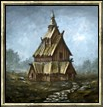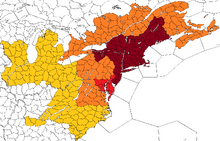Occultist is one of the Religions practiced in After the End. Occultist is part of the Pagan religious group.
Description[]
"Occultist followers believe that the universe is a vast mystery, with the dark corners of reality holding innumerable secrets and dangers. The fragments of ancient lore that survived the Fall have formed the core of a new polytheistic faith quite at odds with most others." ― Occultist description from the game
Gods[]
- High God: The Elder Gods
- God Names: The Spirits, The Ancestors, The Old Ones and The Elder Gods
- Evil God Names: The Dark Spirits, The Crawling Chaos and Flagg
- Scripture: The Codex
History[]
The Occultist faith is a faith born after the Event (or Fall, as it is referenced as by the Occultists), dating at least back to beginning of the XXIV century, when Vincent I of New England ruled over the region as king. The Occultist faith took figures from various folklore tales, conspiracy theories and the works of various authors like H.P. Lovecraft and Stephen King to form the bulk of their religion. It was likely King Vincent I was responsible for pushing the Druidic faith out of New England.
The Occultist faith has survived the fall of the Kingdom of New England, holding the region divided in various chiefdoms.
Legends[]
New England is a land soaked in just as many layers of folklore as horror. First a deeply Catholic land, until the great god returned from the sea, destroying all in its wake. This display of true power forced loyal Catholics to either abandon their faith, or embark on the grand Exodus to St. Louis. With awful darkness now set deep into the hills and forests, never to be truly washed away, the people of New England returned to their druidic ways, painting themselves and chanting hymns to strange gods. Monsters roamed the countryside, born by the deep wounds of apocalypse, creatures with many eyes and many teeth and shrieking voices. Some would be taken away in the night, some would be driven to madness. Men lived short and harsh lives, until Vincent Mahonic rose up from Boston, setting out to civilize this horrid land. He saw the druids for what they truly were, people driven to madness and worship by a god that cared not for them. The Mahonic recognized this deity for what it was, not a manifestation of some nature spirit, but an extra-natural force, an interloper from beyond the stars. The Mahonic knew how to shield people, how to protect the people of New England from their backwards and tribal ways. He taught them the ways of the Pacts, the only ways to protect against these strange deities, and he taught them the names of these awful creatures, and how to drive them away. When the deed was done, and his kingdom stretched from Long Lake to Buffalo, the people were grateful. The forests fell, mines were dug, the wells were cleaned of any strange and unusual colors, and the darkness was finally beaten back. During the reigns of the great kings of New England, the people became hardier, and by the time the last king took his last breath, the Yankees would no longer cower at the sight of a shoggoth or a banshee. Instead the common response to seeing a many-eyed creature with an incomprehensible form slithering around the forest's edge would become something akin to, "Ma! Get th' hatchet!"
Holy Sites[]

Adepts practice at temples such as this where lore is maintained and guarded. They have been described as something of a fraternity and something of a coven with a library like atmosphere.
- Bangor: Historical home of the famous scribe, Stephen King.
- Boston: Many of H.P. Lovecraft's works take place in or around the area of Boston and Massachusetts.
- Albany: Another popular setting for Lovecraft's works.
- Poughkeepsie: The setting of "The Legend of Sleepy Hollow", the story of the Headless Horseman.
- Manhattan: The location of several of Lovecraft's stories (e.g. The Horror at Red Hook) as well as a place where Lovecraft lived during his marriage to Sonia Greene.
Great Holy War Targets/Core Regions[]

Ordered in decreasing importance
- Kingdom of New England - 500 Crusade Weight
- Kingdom of Hudsonia - 500 Crusade Weight
- Kingdom of Gotham - 500 Crusade Weight
- Kingdom of Columbia - 200 Crusade Weight
- Kingdom of Deitscherei - 50 Crusade Weight
- Kingdom of Ontario - 50 Crusade Weight
- Kingdom of Quebec - 50 Crusade Weight
- Kingdom of the Maritimes - 50 Crusade Weight
- Kingdom of Allegheny - 25 Crusade Weight
- Old Dominion(Kingdom) - 20 Crusade Weight
- Kingdom of Michigan - 5 Crusade Weight
- Kingdom of Ohio - 5 Crusade Weight
- Kingdom of Chicagoland - 5 Crusade Weight
- Kingdom of Appalachia - 5 Crusade Weight
- Kingdom of Carolina - 5 Crusade Weight
In-game features[]
- Rulers cannot demand conversion
- Priests (Temple Holders) can inherit titles
- Priests can marry
- Religion allows women to hold Temple Holdings
- Fleets can navigate major rivers
- Rulers can raid infidel neighbors for loot
- Occultist counties and characters are hard to convert
- Non-Pagans (With very low tech) have a very low Supply Limit in Occultist counties
- Can be Reformed
- There is (And can exist) no religious head
- Women may hold Spymaster positions
Rulers of the Occultist faith have access to the conquest and subjugation Casus Belli, and fairly weak rulers can prepare invasions.
An Occultist ruler can choose one of three possible sects to affiliate with;
- Lore of the Old Ones;
- Lore of the Masons;
- Lore of the Pact;
As of 2666, Occultist has a 20.0 moral authority.
A temple holder of the Occultist faith is called Adept.
Occultist Characters 2666[]
Independent & Their Vassals[]
- High Chief Wentworth Akeley of the Migonids
- Chief William Pynchon of Pioneer Valley
- High Chief Randolph King of Penobscot
- High Chief Hector M'Rai of Newopies
- Chief Pépin le Malécite of Allagash
- Chief Jehoram M'Rai of Mattawamkeag
- Chief Jeroboam M'Rai of Moosehead
- High Chief Onesiphorus Miskaton of Nogad
- High Chief Abraham Pabodie of Snowbirds
- Chief Saltborn Pabodie of Ackia
- Chief Paul Mahonic of Boston
- Chief Éric Auseuil of Chaleur
- Chief Cotton Boomer of Plymouth
- Chief Sampson Fenimore of Kennebec
- Chief Bruce Flask of Belknap Lakes
- Chief Enoch Corrigan of Concord
- Chieftess Francisca Horrigan of Coos
- Chief Malcolm Horrigan of Coos
- Chief Fulkes Wheelwright of Southern Maine
Trivia[]
- The Occultist faith is a mix of various sources. The Old Ones seem to come from works of authors such as H. P. Lovecraft, and the Masons are a clear reference to the existing Masons.
- The Holy Site of Sleepy Hallow is probably a reference to the tale of the Headless Horseman, notably featured in Washington Irving's "The Legend of Sleepy Hollow".

